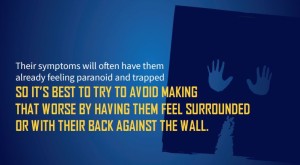When a person experiences an acute psychotic episode, it can be frightening, confusing, and distressing to both the individual and his or her family and friends. Here are some things you can do to make their experience easier.
1. If they are having difficulty concentrating:
- Keep your statements short
- Give one message at a time
- Don’t give too many choices at once
2. If they are expressing delusions and are 100% convinced:
- Don’t argue, say “You’re crazy,” or “ That’s not happening”
- Accept this is their reality. Be true to yourself. You might say, “ I can’t see them but I know you can.”
3. If they are expressing delusions AND have previously been open to discussing them:
- You might gently remind them, “These thoughts come up sometimes” or “ You’ve learned not to give those thoughts too much attention.”
- They might check out their interpretations with someone they trust. You can ask respectfully, “How might that be/happen?”
4. If the person’s behavior is frightening you:
- Give the person space. Move gently to quieter, more open surroundings. Don’t crowd or rush the person.
- Try to speak and act calmly. Ask what might help.
- Try to stay calm and communicate simply and clearly.
- If there are warning signs of a relapse, reassure them that you are seeking help for them.
Once the person experiencing the psychotic episode has calmed down and feels ready to get help, call MindMap at(203) 589-0388 for free effective care. Outside of the ten-town area, make sure you have the numbers shown on our Resources page.
If you feel you need support from first responders due to an acute safety issue, please make sure to do the following:
- When calling 911, it is helpful to say to the operator that your call is regarding a mental health crisis and you require assistance. If your family member/friend has a diagnosis, let the 911 operator know what it is. Advocating for your family member/friend’s treatment and care can help ensure that their illness is taken into account by the police and other emergency responders during their interactions with them.
- If appropriate, request a mobile crisis team to come to your home instead of police. When speaking with the 911 operator and/or police, provide as much information about your family member/friend’s mental illness, prior contact with the law, and any concerns you have about the situation.
- Be prepared to repeat this information once police or other emergency responders arrive.
- If you must vacate the premises to call the police, stay close enough so that you can identify yourself and speak with officers when they arrive.




